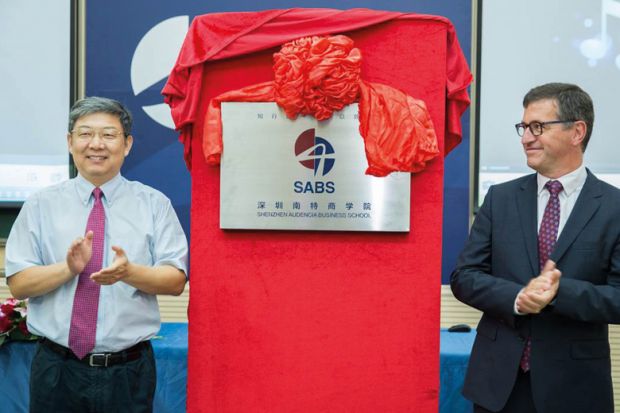The dean of a new French and Chinese business school believes that French institutions must find new ways to internationalise their education to help them compete globally.
At the end of September, the Shenzhen Audencia Business School (SABS), a joint venture between Audencia Business School, based in Nantes, western France, and Shenzhen University in China, opened its doors in southern China’s Guangdong province.
Christophe Germain, currently vice-dean of Audencia, told Times Higher Education that at a time when business schools were jockeying for position in a competitive global environment, the collaboration offered his institution a “unique” opportunity to develop in a “very dynamic” part of the world.
“In my opinion, French business education is not bad at all,” he said. “If you look at the [Financial Times] rankings of master’s in management, seven French schools are in the top 25.
“But it’s true that we need to find new ways to internationalise French business education. The opening of SABS shows that the French business education system has assets and advantages to trigger the interests of international institutions [and encourage them] to take up collaborations.”
Under the partnership, Shenzhen has provided the infrastructure and financing, while Audencia brings the academic expertise and leadership of one of France’s leading business schools. The school’s opening comes at a time when French higher education has been under the spotlight for its transnational offerings.
While French business schools are some of the more active higher education institutions overseas, educating 3,000 students outside France, a recent report by the thinktank France Stratégie highlighted an “urgent” need for a new strategy for the country’s higher education export industry more generally.
Professor Germain said that the collaboration was a key part of Audencia’s ambition to become a leading international business school, as set out in its 2020 strategic plan. Initially launching three programmes in 2017 – an MBA, a DBA and a master’s – SABS plans to create more courses and to cater for a diverse student body.
“We plan to have approximately 500 students in three years, with 50 per cent international, coming from Europe, but also from the south-east of Asia,” he said. “Our ambition is to develop an international school with strong expertise related to the economic environment of Shenzhen. The economic environment is very dynamic, with [multinational] companies like [telecommunications organisation] Huawei or [technology firm] Tencent [based there].
“The form of collaboration is very special because it’s a joint venture. I think it’s the first time that a partnership based on a joint venture has been set up between a French business school and a Chinese university.”
He added that Audencia – which has just opened a branch in Paris – also plans to launch a campus in South America within three years, while an agreement with the Ivory Coast’s Institut National Polytechnique Félix Houphouët-Boigny (INP-HB) to create a cooperative centre for studies on INP-HB’s campus was announced in June.
后记
Print headline: French school means business with China link
请先注册再继续
为何要注册?
- 注册是免费的,而且十分便捷
- 注册成功后,您每月可免费阅读3篇文章
- 订阅我们的邮件
已经注册或者是已订阅?

